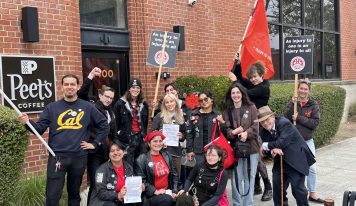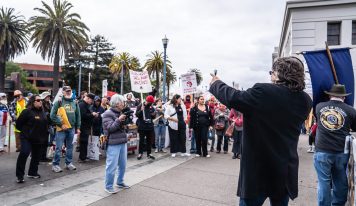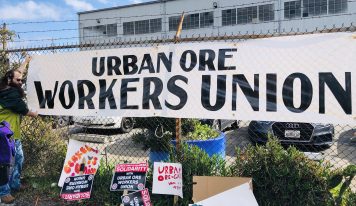Last month, workers representing Google announced the formation of the Alphabet Workers Union(AWU), culminating years of worker activism at one of the world’s largest tech companies. The union’s formation represents a watershed moment for tech workers everywhere. Having only been public for a month, the AWU is still in the early days and will have many opportunities to prove its worth. AWU Spokesperson Alex Gorowara –– a Software Engineer for Google based in Cambridge, Massachusetts –– spoke with the San Francisco Independent Journal last week. What we find with the AWU is a potential road map for greater democratization of the workplace. Read our full interview below with Mr. Gorowara.

How has the bottom line gotten in the way of Google?
Well, we can begin with what the founders promised not to be in their letter for when the company went public: “a conventional company.” And while acknowledging that this isn’t about a notion of “Oh we used to be this and are now this,” there have always been problems with conventional issues. Focusing first on profit, and then on failing to respect people of diverse backgrounds that have been a part of the company from the beginning. And one thing that we [at AWU] are looking to do is make sure that everyone is protected and respected.
Upon the formation, it is my understanding that there have been numerous petitions brought to the management of Google to make changes before the AWU was formed. Can you speak to those unheeded calls and the union’s place there?
So you are absolutely right, we are building on a long history of worker activism at Google, and a long history of workers caring about their colleagues and their work and how their work is used. Not only in the resource groups, especially for Googlers of underrepresented gender identities, sexual orientations, and ethnic backgrounds. As with what we’re doing about those outstanding positions, it is a complicated question. Because that one principle that we are holding to is that we are a Democratic Union. We want to listen. We are going to listen to what our members say and want. And right now––having recently grown fourfold––figuring out how to best heed that voice of the workers, is an ongoing project. I will say that we’re, we’re stepping up organizing in defense of, in particular, a recent data center employee, Shannon Wait. We do have a public statement up on our website with probably more detail than I can get off the top of my head. We’re standing with, and I believe helping to support and represent a data center worker––[who is] not technically an employee of Google or Alphabet, but one of those Temps, Vendors, and Contractors, that makes up half the workforce and really isn’t recognized or respected in the same way that full-time employees often are––after she was fired for what we view as protected activity. So I think that’s a solid first step towards making sure that workers in a variety of backgrounds in a variety of places, not just the invisible ones in the offices are protected.
I did read that press release and when I saw it I kind of thought it was exemplary of what you guys are trying to create. I know some of the values are up on your website, like solidarity democracy, economic justice. What are the goals and values of the Union?
Among the principles of the Union are that every worker has a voice. That’s why we’re set up as we are as a Democratic Union, as a union where the membership makes decisions. And part of that is making sure that the people who have been historically silenced, historically pushed to the sides––in some cases because of race or gender or orientation. In some cases, because they have temporary contracts with other companies, even though they’re effectively working all of their time at Alphabet, but are considered expendable, or not worth the same benefits, just because they’re in a different job role. We want one thing that we do notice repeatedly. When it’s visible at least there are a lot of cases where it’s, I suppose, easy to overlook if you’re in a position of privilege. What we noticed repeatedly is that we cannot count on the company to treat us all consistently with dignity and respect. There are some advantages that some of us have because of market conditions. But even then, the folks who put themselves out there the folks who are on the periphery, the folks who may have other disadvantages, in the market, again because of background because of the positions that they have and stand up and speak out and try to start a conversation. We see that nobody, nobody is privileged enough to protect them from a company that doesn’t like what they’re saying, and many many people have much less protection than others and we all have less protection and security than we deserve. When we’re talking about discussing ethics and conversations about the direction of our workplace.
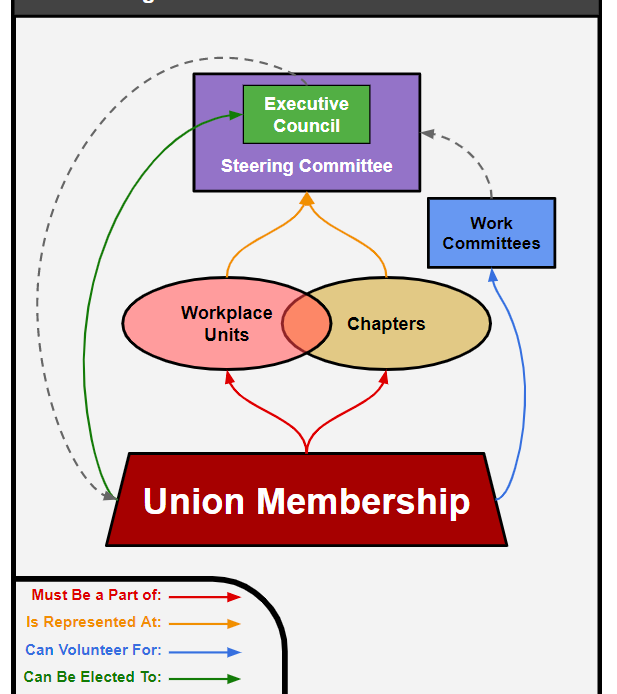
Can speak more as well about the structure of the Union? I saw that little graphic you have on your website. Do you hold any of the positions in the working committees? How does the Executive Council behave towards Alphabet or Google as a whole?
You’ve captured most of the structure. There are committees where people who are interested, who have something to say about a topic can join in and talk about, say internal messaging or external communications, or how we want to spread information for members, [or] what we want to do about civil rights and equity, or maybe making sure that people at all levels of ability have. So there are all sorts of companies out there as you mentioned the Executive Council. And other than that there’s not really much of a distinction. There are also workplace units. So folks, organizing, especially when there’s a critical mass, around these specific interests of, for example, their product area. I can’t give out any specific workplace units. But I can say hypothetically if I were to work in Google travel, there could be a travel workplace unit that exists to group people together who may have concerns, specifically about this one product area. As for the Executive Council so far, right now we’re all figuring a lot of stuff out. So we have had a great deal of help from the Communication Workers of America. But there are a lot of things that we need to figure out on our own, especially since the membership quadrupled in just a month. We’re all learning how to scale up conversations. Again, make sure that we’re listening to everybody, getting everyone’s voice in the conversation.
You just mentioned the membership has quadrupled. Can you speak to the feel within the workplace? Has there been enthusiasm from people who you may not have thought of? Has there been any unexpected pushback?
I’ve seen coworkers enthusiastic about the idea. Some of them I think are not unreasonably waiting for the union to really demonstrate its value. Especially in these upcoming cases, like the one with Shannon the data center worker, the union is going to have a fantastic chance to demonstrate its value and really get its story out there. So I’m looking forward to how people react to that. In terms of pushback. We haven’t gotten to the best of my knowledge, any pushback from Alphabet. Frankly, we think that part of their strategy is that they’re going to hope that we go away. We’ve got 800 members and a long history of worker activism at Google that I think says we won’t.
Another question I have is related to these workplace units. It seems to be through the website that a lot of the people in the Union are engineers. So is the growth of the Union going to be outside of just engineers?
Absolutely. So, a couple of clarifications. The people on our website are not necessarily a random representative sample. They’re the folks who feel comfortable having their name up there, and certainly, we’ve got people who are not engineers. We are continually looking at how we’re recruiting, how we’re reaching out, how we’re serving our members. We are aware that we need to actively work to make sure that we are welcoming and effectively serving people who are, again, not the highly visible employees. The folks who are not the office workers that a lot of people think of when they think of Google and Alphabet. So, that is something that’s at the upper lines. Also, part of the reason that you’re seeing so many engineers represented as the public face of the Union is that it is a bit of a risk going public. Everyone has had to make a complex decision about how much risk they’re willing to take and how public they’re willing to be. For example, when I was considering being a spokesperson, [some] of the things that I thought was, you know, I am a relatively young man, I don’t have any outstanding debts or dependence. If worst comes to worst, and my public activism gets me retaliated against or my career derailed in some way, I am in a much better position, than some others around me to land on my feet. That’s not fair, certainly. It’s a privilege that I have. But I think that what you’re seeing is a lot of people saying, ‘as someone with this kind of privilege. I feel comfortable enough, making this public stand.’ And a lot of other people are making entirely reasonable decisions for themselves that they want to stay less visible, less public for a while. So, to circle back to your question. It is my fervent hope that we continue to recruit heavily from all parts of Alphabet from all sorts of workers and serve them faithfully and serve them well. But I do think that you’re going to see an over-representation of a certain sort of worker, not, not because of an over-representation in the member body, but because of who feels safe and who has the privilege to feel more confident standing up publicly.
The union has some kind of lofty goals with things like climate justice or social justice. So, how does that translate to more of the day to day improvement, like in the day to day workload?
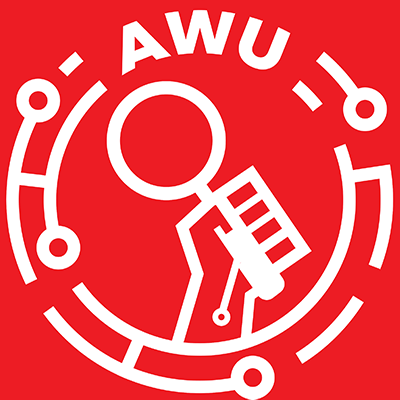
Again, it’s a good question. Unfortunately, I think my answer isn’t going to be terribly concrete and I think the answer is that we are still figuring it out to some extent. Again we’re still figuring out what it is that our members are invested in what, what sort of priorities we want to assign to what sort of efforts. I suspect that going forward this conversation may well be prompted within the union by some change in what Alphabet is doing. I would not be shocked if the point at which it really gets into everyone’s minds would also be the point where we see something change in Alphabet’s behavior, whether for the worse or the better. So it might be that we see something going on and we say, “this is a great step but it’s not enough.” Because we also exist to reinforce Alphabet’s better impulses, as well as curb its worse impulses. There are certainly some things that it’s looking in the right direction in. And we want to continue to encourage them to do the right thing where they’re doing.
How have you felt personally as a worker? Have you felt more empowered? Maybe a little nervous or even excited about the prospects of this union developing and changing your workplace?
Yes to all of those. So, one thing that I think has really stuck with me is that I think a lot of other folks may have started out with a particular idealistic vision of Alphabet or Google from the outset. From the early days, we saw that it’s this company that’s doing this awesome thing or, we have the opportunity to do so much good. And then over time, we saw some of the internal. We saw some of how it treated its people. Now, we’re paying more attention. And it turns out that it’s doing some really ambitious things but it’s also doing a lot of conventional sort of business as usual things. It’s really not fulfilling its potential to do great stuff for the world. And I like I believe a lot of other union members. I’m excited to be able to push that company, a little bit closer to that ideal. A little bit closer to that great force for good in the world that treats its people well, and makes the world better. So that’s what I’ve been feeling: that kind of excitement. And that hope for an idealism that I had when I started gradually dropped over time but has since picked back up with a new justification.
To think about it almost theoretically, a lot of unions are created to protect from the exploitation of traditional forms of labor, like workman’s comp and overworking too many hours, things like that. But it seems like there’s a message here that you are trying to push that’s beyond that. One that is almost more related to the ethics of the product you’re creating rather than the actual labor expended.
That is definitely an aspect of it but I wouldn’t say that we are dropping either aspect. We are focusing on the challenges that are relevant to us. For some people within Alphabet that exploitation is being treated unfairly, being denied benefits, or being fired unduly, and we are absolutely still here to protect those people. But in addition to that important work of protecting ourselves, economically and psychologically within the workplace, we’re also here to have a voice in the ethics of the workplace. So it’s really both.
I can see that understanding. You did mention earlier that there are those precarious workers like you used an acronym.
Temps vendors and contractors: TVC. Sort of a catch-all for anyone who is not a full-time employee of Alphabet or a subsidiary so maybe they’re on a temporary contract with Alphabet. Maybe they are working for a company that alphabet has contracted out to. But either way, they’re doing work at Alphabet for the company, making its product. So as far as we’re concerned they are workers of Alphabet, the same as any full-time employee. The difference is really on paper.
Then, for example, to clarify the membership of the Union. Are they [TVCs] able to join the Union?
It does include these TVCs. Temps, Vendors, and Contractors include people who work at Google, who work at sister companies, contractors. Anyone who does their job, primarily at or for Alphabet, no matter whose name is on their payroll, is welcome in the Union.
Can you speak more to the plans of expansion– Do you have ways of growing the membership? Do you pass out flyers at work? What’s the process?
It isn’t very formal. We do have intakes where we have a way for folks to sign a form. But the way that we’re growing, in addition to these announcements, has been in part the same way that we were growing, even when we were secret: by talking to people, by having conversations with them about what they care about what maybe leads them to be interested in the Union, and really getting to know them. So that’s, that’s how we recruited before when we were sort of clandestine, we were talking one–on–one. Now we can talk in larger groups. We’ve had a couple of occasions where we’ve had virtual events like “ask us anything about the union.” But the underlying idea of: “why we’re here to talk to people about what they care about.” And if they care about things that could be helped by a union, then we’re gonna recommend that to them. That hasn’t changed.
Could you explain your own history with the company? How long you’ve worked there? and just kind of what your overall trajectory of how you felt? You mentioned you’ve gone through different feelings throughout your time.
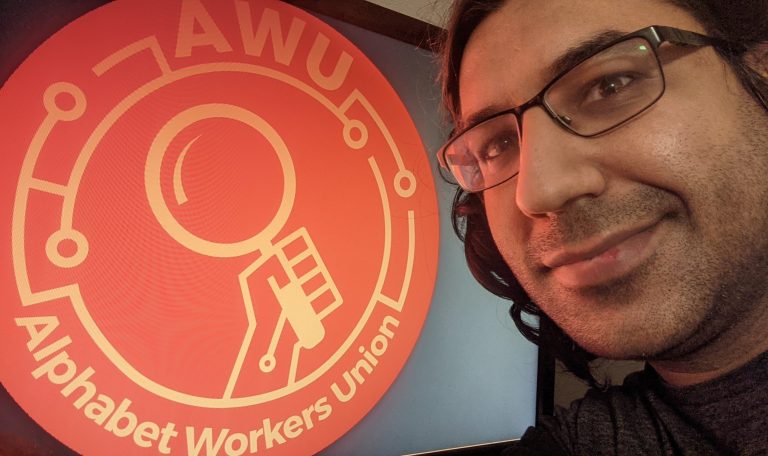
I have been at Google for a little over five and a half years now since I graduated college in 2015. And when I started I was very excited to be contributing to what I saw as a company that was really pushing the envelope for good. So a company that was coming up with great ideas that change the world for the better. Over time, as I saw more and more of how the company conducted itself––not anything confidential or internal even. But even just the change of “oh, now it’s my company I’m paying more attention to it in the news.” When I see stuff like this one executive was credibly accused of sexual harassment and given a $90 million payout to just sort of go away quietly. When I see stuff like the firing of Dr. Timnit Gebru, and I see the four were fired Thanksgiving of 2019 for trying to start a discussion. Each of those chipped away at my confidence that Google and Alphabet were doing the right thing. To say nothing of the very overt symbolism of dropping the motto “Don’t be evil.” And, yes, over time, I began to lose confidence in Alphabet. To an extent, my opinions on Alphabet’s executive leadership haven’t changed so much as my opinions on the future of the company. When workers have a voice and when it’s not just executives arbitrarily making decisions behind closed doors; when it’s workers, making sure that the decisions happen in the light. Making sure that they are appropriately transparent fighting to protect the interests of the people who are affected by them: that is what I’m hopeful for now. A company that is heavily informed by the ethics and the judgment of the people who work there and care about it. Because that’s really why we’re here in this union, especially the folks who have the privilege to hypothetically be able to pack up and work elsewhere. We’re here because we care about our work. We’re here because we care about our co-workers, and we’re here because we care about the company and would rather try to help set it right than abandon ship.
What kind of advice would you give to other people who might want to start organizing their workplace? Or tech workers trying to organize against their bigger company?
My recommendation is to talk to people to figure out what’s important to them and recognize your own power because, at the end of the day, the workers are the people who make the company run. We are the folks who have built up Alphabet. To anyone who’s considering a similar endeavor: you are the folks who are making up your company. You are making the work happen, you are creating the value. And it doesn’t take too much to band together with a couple of like-minded folks, talk it over, and present a united front. And really, you have more power than you expect.
Do you have any other final comments or anything else you want to share?
I just want to reiterate something I said near the end. We’re all here because we care about each other, we care about our workplace, we care about our work, and its impact on the world. And I also want to clarify that some folks have had to, or have been, forced to leave. And to be clear, everybody needs to make the decision that’s right for them. The people who are staying at Alphabet and working for it to get better, I think we can respect them without impugning the motives or dedication of anyone who made the decision to leave or was forced out. But I’m hopeful that the folks who are able to stay can make, frankly, a tremendous difference in the ethics of the company.



